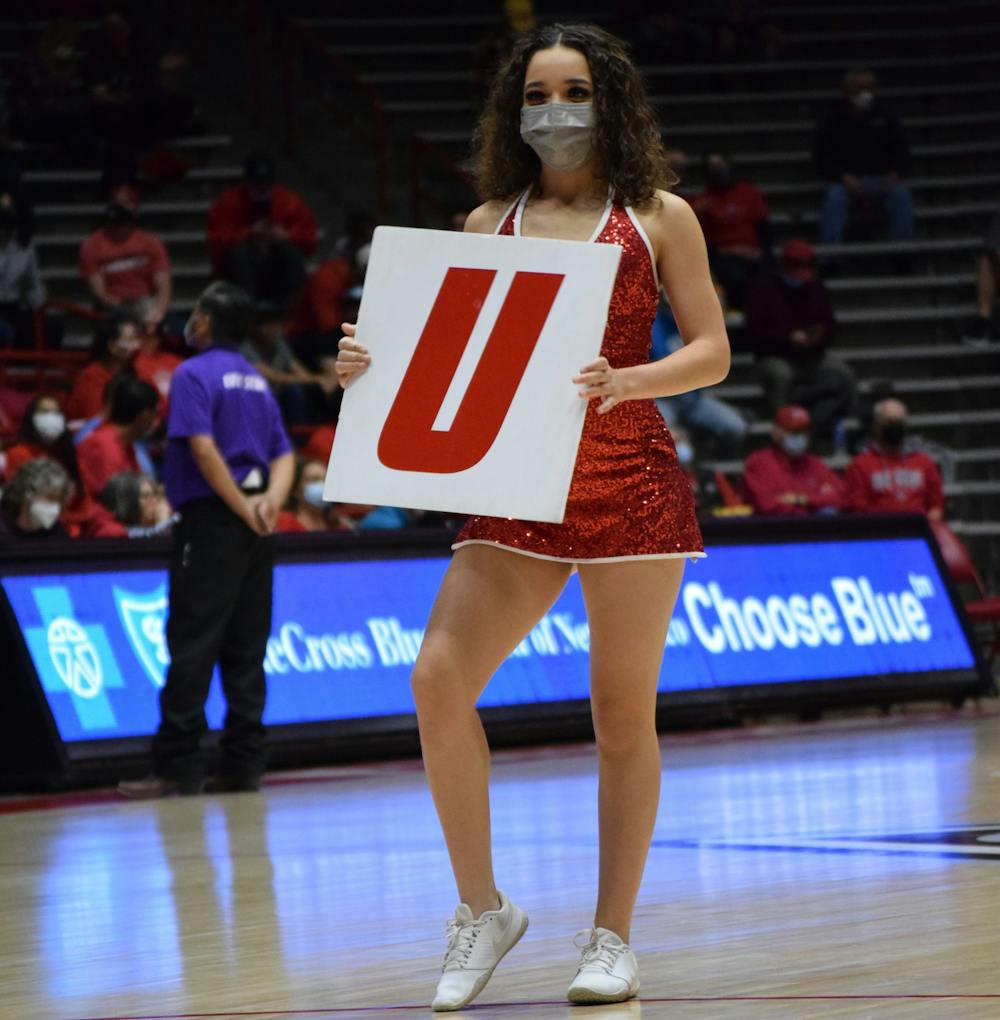As members of the Lobo Spirit Program work to uphold standards of both athleticism and artistry, their physical appearance must also be put up for the consumption of both judges and the general populace alike. The pressure of expectations of how they should look often negatively impact the athletes.
Fifth-year cheerleader Amaia Bracamontes is one of the many that has been affected by the public’s perception of how members of the Spirit Program should look.
“Obviously, the image of a cheerleader, a lot of people think, is super small and skinny and fit … and so I think that people who don’t know a lot about cheer assume that everybody has to fit that certain image,” Bracamontes said. “And so that has had its personal effect on me, where I feel like I haven’t fit that image.”
Bracamontes, who has been in cheer for close to 12 years, said outside perceptions of cheer have had a great effect not only on her own self-image but also on the self-image of those around her.
“I definitely have had friends that didn’t necessarily feel comfortable wearing the crop top, or the tight uniform, or they felt insecure, feeling like they were looking a certain type of way in the uniform and that people were gonna have comments,” Bracamontes said.
Lauren Saad, a senior on the coed cheer team, said these outside perspectives have put great pressure on her and talked about the sexualization she has endured in her sport.
“Definitely at games, we’re in crop tops and spandex, and you definitely get the old men at the games whistling at you, barking at you,” Saad said. “And it’s not a sexualized thing, you know. It’s what we wear; that’s kind of part of the sport, but the sexualization placed on it … you don’t get that with a women’s basketball team and softball.”
Many fans feel at liberty to touch the dancers, according to dance team senior Hannah Herring, who has a handful of “fans'' who are overly comfortable with trying to talk to and touch her. She said that, early in her career on the Spirit team, there was pressure to fit a certain body type to avoid the criticism of mean fans and to fit into the dance uniforms, which are notably shorter than those for cheer.
Standards set by the program require members to apply a full base, dark eye makeup, dense false lashes and a specific shade of red lipstick, according to Herring.
“The makeup doesn’t make me perform better,” Saad said. “It doesn’t make me look better in front of a crowd, but it’s just kind of what we have to do. It’s part of the culture.”
Makeup in the sport is meant to enhance features for emoting, according to Herring, but being in the sport for a long time has deeply affected the way she looks at herself.
“I’m now reflecting on that and realizing that that early introduction into such heavy makeup application really has defined the way that I see my face, and I’m kind of realizing now in my older age that I don’t really know what I look like,” Herring said.
Get content from The Daily Lobo delivered to your inbox
Saad noted a pressure to fit a particular body standard on the coed team, which the men sometimes play into by wanting to partner for stunts with smaller or more muscular girls.
Herring said that, over her time on the team, the program has grown more encouraging of supporting dancers of different body sizes.
“My own team has been very good about being inclusive and stuff, but I know that there are other cheer teams who do weight checks for their flyers and push them to look a certain way, and so I think that can be discouraging to girls that have the skills but don’t weigh a certain amount,” Bracamontes said.
Bracamontes feels lucky that she is a part of a program that, she believes, does what it can to mitigate the potentially damaging parts of the sport by emphasizing strength over aesthetic body goals.
“I think, personally, I feel supported by my team and that makes me feel confident. I try not to let those body image things get to me too much, but it more just comes from the outside,” Bracamontes said.
Herring said that even though the Lobo Spirit Program is not a particularly toxic one within the dance community at large, there is still a long way to go in getting rid of the unhealthy beauty standards present in the community.
“I have so much love for the program and I have so much respect for my coaching staff, but at the same time, the waters are infested with sharks,” Herring said.
Zara Roy is the news editor at the Daily Lobo. She can be contacted at news@dailylobo.com or on Twitter @zarazzledazzle






